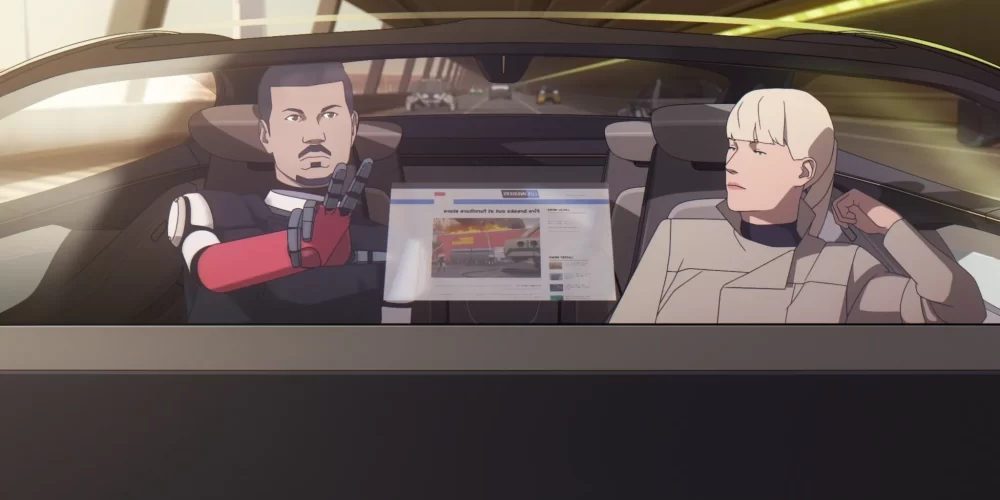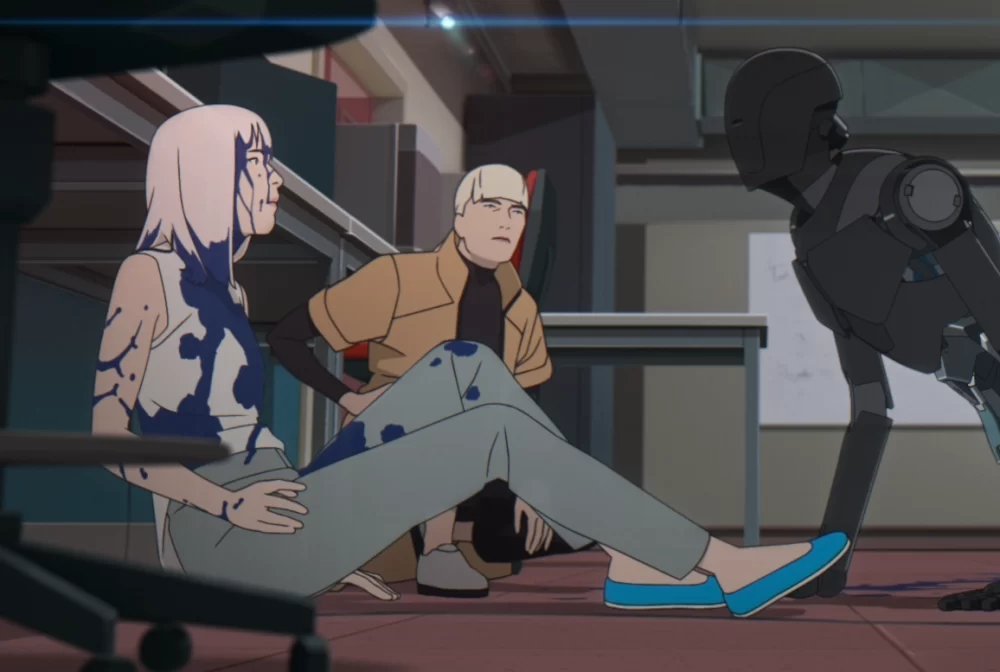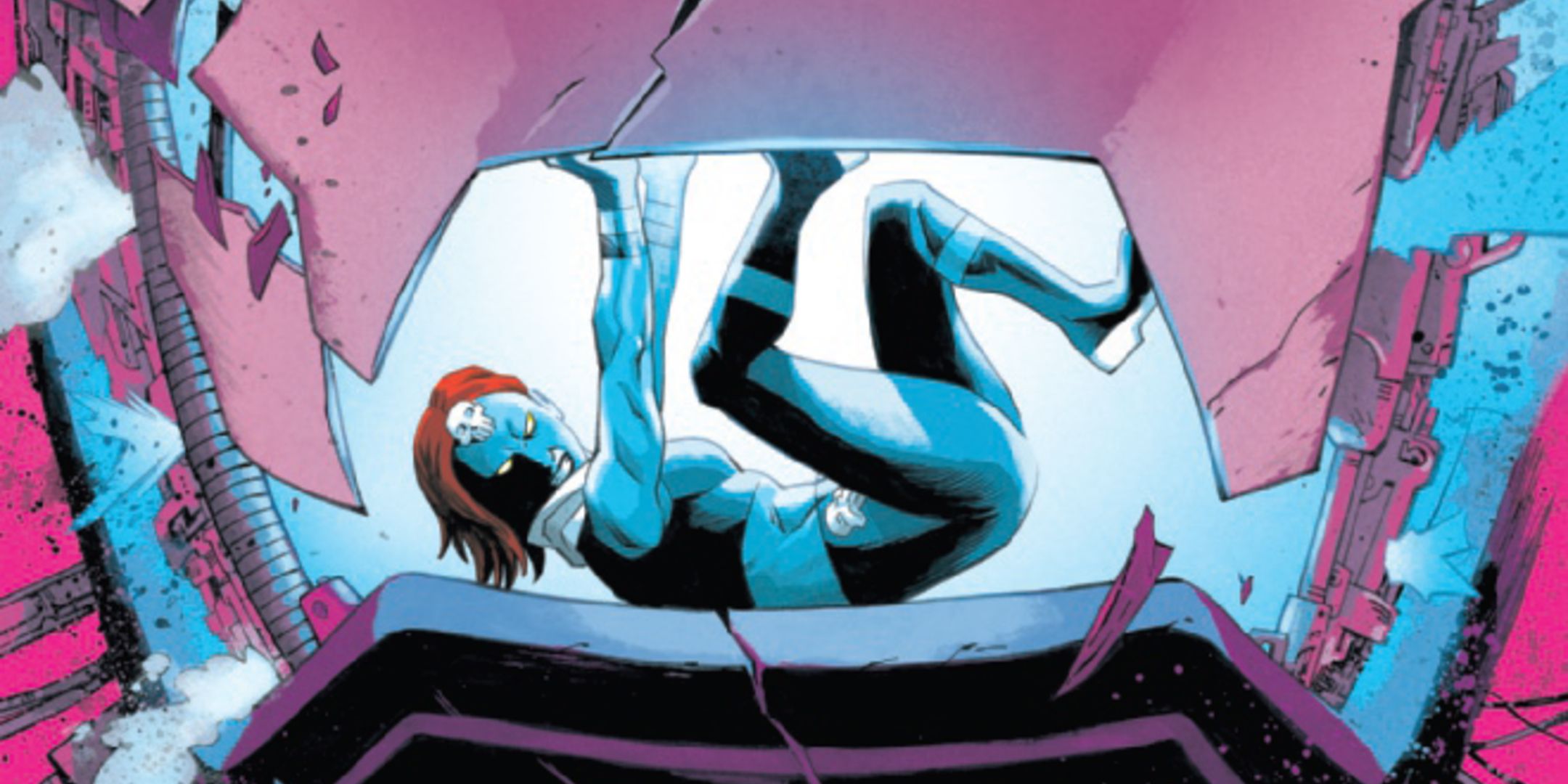Robots have long been the go-to metaphor for artificial life taking over humanity. Recent developments in artificial intelligence and automated services have made that metaphor more focused, and as a result more urgent. In fact, given the nature of AI and how information gets copied and reproduced, robots have become more tragic figures. They’re often seen as something that new tech is shedding for more sophisticated expressions of progress and efficiency. Mark Russell’s Not All Robots is a great example of this, in which older robots lament the rise of newer and shinier automatons with humans feeling increasingly irrelevant in the face of this.
Jérémie Périn’s cyberpunk neo-noir animation Mars Express certainly addresses the role robots play in the race for human irrelevance, but then it dares look beyond them for a more terrifying possibility that sees the evolutionary process of technology go full circle into something that more closely mimics organic material. The result is a cautionary tale that doesn’t skimp on action to get the point across. In fact, it embraces it and turns it into a marker of existential superiority that threatens to completely obliterate the status quo and blot out humanity once and for all.
Mars Express follows a detective called Aline Ruby and her robot partner Carlos Rivera as they investigate the disappearance of one Jun Chow, a cybernetics student that’s taken to jailbreaking robots (freeing them from their programmed routines and directives). Like any good old noir, neo or not, a more powerful interest hovers in the background sending goons to make the detectives’ case way harder to solve. And in classic cyberpunk fashion, those interests revolve around a megacorporation that is invested in keeping a foothold on technological advancement.
Aline is the classic jaded detective we’ve come to expect from noir stories, the kind that carry the weight of the world on their shoulders and have a distinctly cynical view on things because of it. That view, however, comes with added wrinkles as she navigates the case with Carlos, who is an android copy of her partner who died five years earlier.
Carlos’ consciousness resides in an artificial body that displays an accurately rendered hologram of his head. His memories carry over, bringing with it a desire to continue living the life he left behind. Robots are no longer entirely artificial here. The human conscience can be transferred over to an artificial body, fundamentally changing our relationship with mortality. Aline seems to be aware of this, and her perspective on it informs her approach to the Jun Chow case.
In a sense, the noir detective can’t just stick to her corner of the world and watch as the world continues spinning on its own crooked axis, resigned to its morally fractured machinations. She has to spin along with it. Otherwise, she runs the risk of becoming obsolete and useless in her role.
The animation communicates this well. Visuals are clean and smooth, giving environments an artificial sheen that builds on the idea that pristineness is a marker of progress and perfection. Character designs freely embrace body modifications, for instance, but they’re subtly incorporated so they don’t make humans look like cyborgs. This is an important detail and it strengthens the movie’s exploration of the ways in which tech moves towards mimicking reality to the point that it becomes near impossible to tell it apart from artifice.
Mars Express also wears its influences proudly on its sleeves, especially when it comes to the beautifully choreographed action sequences. Some of them remind of Terminator 2: Judgment Day, while others seem ripped straight out of Ghost in the Shell. Now they do stand out on their own thanks to their intentionality. These sequences bring attention to the hidden dangers of mods and how, they too, erode the balance between humanity and robotics. There’s just no way anyone could survive in this version of the future if they were 100% human.
The future of Mars Express suggests that technology is much like an ouroboros, a snake eating its own tail. This particular snake, though, remakes and updates what it eats of itself. It becomes stronger the more it consumes. Director Jérémie Perín manages to illustrate this with a great sense of imagination. Mars Express is a visually arresting film, stunning even. You’ll certainly appreciate this as you see watch humanity plant the seeds of its own destruction.





















 English (US) ·
English (US) ·